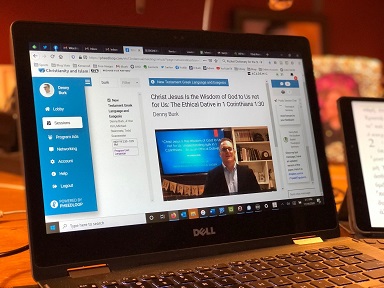The 72nd annual “meeting” of the Evangelical Theological Society begins on Monday. I put “meeting” in scare-quotes because our in-person gathering in Providence, Rhode Island has become another COVID casualty. Nevertheless, the event organizers have put on a fantastic virtual version of our meeting that in some ways may facilitate more scholarly interaction. I’ve already listened to 8 papers including both sections of the “Evangelicals and Gender” group. I never would have gotten to hear so many papers in the usual format. So this is good.
Presenters have already uploaded videos of ourselves to the event website, and anyone who is registered for the meeting can watch the presentations. I recorded mine in my living room. (I may or may not have been wearing shorts and tube sox with my sport coat. You’ll never know!)
In any case, my paper deals with the meaning of “for us” in 1 Corinthians 1:30.
“It is because of him that you are in Christ Jesus, who has become for us wisdom from God– that is, our righteousness, holiness and redemption” (NIV).
There has been a longstanding debate about how this text informs our view of the imputation of Christ’s righteousness. For example, N. T. Wright claims that it is the only verse in the entire Bible that arguably even mentions the righteousness of Christ, but it is nevertheless NOT a reference to imputation. John Piper argues on the contrary that it does refer to the imputation of Christ’s righteousness. I argue that they are both wrong. Here’s a little excerpt:
Piper and Wright both agree that Christ becomes these four things for us in some sense. That is the starting-point of their discussion, and I am writing this paper to argue that they are both wrong on this point. To put a fine point on it, they are reading the dative first person plural pronoun incorrectly as a Dative of Advantage. The aim of this paper is to demonstrate that the meaning of the dative [to us] has been widely misunderstood by interpreters on all sides of the debate about the imputation of Christ’s righteousness in 1 Corinthians 1:30. Most interpreters take [to us] to be a Dative of Advantage, so that Christ becomes something “for us.” I will show that the syntactical construction in view appears elsewhere in the New Testament and Septuagint not as a Dative of Advantage but as an Ethical Dative, and it should be understood as such in 1 Corinthians 1:30. Understood as an Ethical Dative, [to us] indicates how the “us” feels about and appraises Christ. It speaks of the viewpoint of the person in the dative case.
The key idea, then, is that Christ Jesus becomes “the wisdom of God to us” not “for us.” Allow me to illustrate the usage with an English expression. If I say, “Our children are very dear to us,” that is a statement about how the dative “us” have come to regard “the children.” The Ethical Dative is thus one way for the parents to express an affectionate regard for their children. The dative means something like, “Our children are very dear in our sight” or “in our estimation of them.” That is the way that Paul speaks about Christ Jesus becoming the wisdom of God to us. He’s not talking about what Christ became for us but what Christ became to us. “It is by his doing that we are in Christ Jesus, who became [very dear to us; he became] the wisdom of God to us.” This is a statement about how God in his sovereign grace changes Paul’s and the Corinthians’ regard for Christ so that they no longer view him as the world views him—as weak and foolish and worthless. No, because of God’s lavish grace, Paul and the Corinthians now see him as he really is—the very wisdom of God.
Those registered for the conference can get the rest of the paper at the event website. I have both the manuscript and the video posted there, so you have a choice to watch or read. I recommend reading.
We’ll have live interaction about my paper and the others from the “New Testament Greek Language and Exegesis” section on Thursday, November
19 at 2:30pm ET. I hope to see you there!
—————
(By the way, if you are interested in participating in the conference, you can get info about the program here and register here.)





